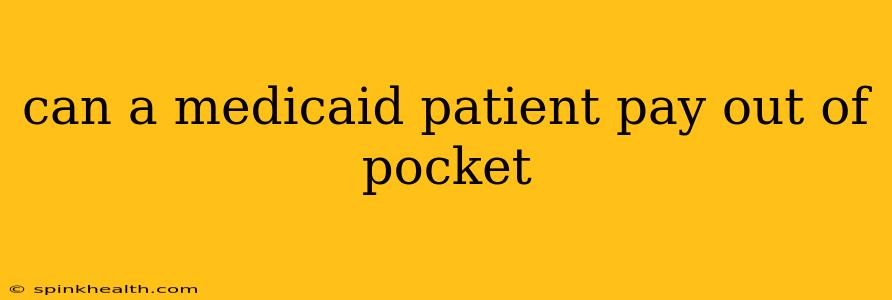Can a Medicaid Patient Pay Out of Pocket? Navigating the World of Medicaid and Personal Payments
Imagine this: Sarah, a hardworking single mother, recently lost her job and found herself needing healthcare. She enrolled in Medicaid, grateful for the safety net it provided. But during a recent doctor's visit, she was presented with a bill for a procedure her insurance didn't fully cover. Could she pay out of pocket? This scenario highlights a common question: Can a Medicaid patient pay out of pocket? The short answer is yes, but it's a nuanced situation.
Medicaid, a joint state and federal program, aims to provide healthcare to low-income individuals and families. While it covers a significant portion of medical expenses, it doesn't always cover everything. Understanding the intricacies of out-of-pocket payments with Medicaid is crucial for patients.
What Does Medicaid Typically Cover?
Medicaid's coverage varies by state, but generally includes essential healthcare services like doctor visits, hospital stays, prescription drugs, and preventative care. However, there are often limitations. Some services might require pre-authorization, and certain procedures or medications might not be fully covered. This leaves room for out-of-pocket expenses.
What are Common Out-of-Pocket Costs for Medicaid Patients?
Copayments: Medicaid may require patients to pay a small copayment for each doctor's visit or prescription. These amounts are usually low, but they still add up.
Coinsurance: This is a percentage of the cost of a service that the patient is responsible for after meeting a deductible (if applicable). Medicaid may have coinsurance requirements, meaning you'll need to pay a portion of the bill.
Deductibles: Some Medicaid plans have deductibles, meaning you have to pay a certain amount out-of-pocket before your insurance begins to cover services.
Non-Covered Services: Certain services might not be covered by Medicaid at all, forcing patients to pay the entire cost themselves. This can include certain types of therapies, elective procedures, or experimental treatments.
Non-Participating Providers: If a provider doesn't accept Medicaid, the patient may be responsible for the full cost of the services. This emphasizes the importance of verifying whether your provider is in your Medicaid network.
How Can I Determine What Medicaid Covers?
Understanding your specific Medicaid plan is critical. Your state's Medicaid agency website will have detailed information about your plan's coverage, including what services are covered, any copays or coinsurance, and any deductible. Always contact your Medicaid provider or healthcare provider if you have any doubts about coverage before receiving services.
What Happens if I Can't Afford Out-of-Pocket Costs?
If you find yourself facing unexpected out-of-pocket costs with Medicaid and struggling to pay, don't despair. Several resources can help:
- Negotiate with the Provider: Explain your financial situation to the provider's billing department. They may be willing to work with you on a payment plan.
- Apply for Financial Assistance: Hospitals and clinics often have financial assistance programs to help patients manage costs. Inquire about these options.
- Seek Help from Local Charities: Many community organizations offer assistance to those facing financial hardship in paying medical bills. Look into local charities in your area.
Can I Use a Health Savings Account (HSA) or Flexible Spending Account (FSA) with Medicaid?
The ability to use an HSA or FSA with Medicaid varies. HSAs generally aren't compatible with Medicaid because it's not a high-deductible health plan. FSAs, however, might be used to cover eligible medical expenses not covered by Medicaid. Consult your plan documents to clarify.
Navigating the complexities of Medicaid and out-of-pocket payments can be challenging. By understanding your plan's coverage, exploring financial assistance options, and communicating effectively with your healthcare providers, you can successfully manage healthcare costs while utilizing the benefits of Medicaid. Remember, proactive communication is key to preventing unexpected financial burdens.

